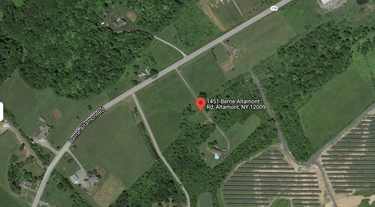Long-standing covenant struck off Knox property after litigation
— Google Maps
Mary Varbero and Frank Muia, the owners of 1451 Berne-Altamont Road, have succeeded in their quest to free their Berne-Altamont Road property from the restrictions dictated by a covenant that the previous property owner said she was forced to agree to by the town’s planning board in the early 1990s.
KNOX — A covenant that long prevented Knox residents Mary Varbero and Frank Muia from subdividing their 10-acre property at 1451 Berne-Altamont Road has been struck down by New York State Supreme Court Acting Justice Denise Hartman in a summary judgment.
The judgment, obtained by The Enterprise, does not divulge Hartman’s reasoning, only her order that the covenant be made “null and void” immediately and indefinitely.
Muia, who informed The Enterprise of the decision this week, said of the original landowner, “Betty Walk was right all along.”
Muia could not be reached again for comment, nor could his attorney, Timothy Elliott. Elliott is also the attorney representing another Knox family, the Dohertys, who, like Muia and Varbero, are attempting to get out from under a covenant on their property, though it was one that they themselves had agreed to. The Doherty suit was filed with the Albany County Clerk on the same day as the Varbero/Muia suit, and its outcome is currently unknown.
The Berne-Altamont Road covenant was written in 1992 as part of an agreement that Knox resident Elizabeth Walk made with the Knox Planning Board when Walk wanted to break off and sell four 10-acre parcels from the 200 acres that she owned. She had, since the death of her husband in 1986, been selling off her land bit-by-bit to cover debts.
“The town … tied my hands,” Walk told The Enterprise this week. “My husband had passed away and he had many, many bills. He was only 48 and owned his own business. There were a lot of bills to be paid and I was struggling very hard, and [the town] refused to let me do anything.”
The covenant was thought up as a compromise — Walk would be able to sell her property, and the town wouldn’t need to worry about proliferating development in that area. Although Muia would later argue that the covenant was illegal because it was made by the town’s request rather than Walk’s, a University at Albany professor told The Enterprise in 2006 that covenants of that nature are indeed legal.
However, the covenant for 1451 Berne-Altamont Road was written on the property’s map, The Enterprise discovered in 2006, rather than into the deed, where covenants are typically found.
Because the covenant was not written into the deed, Varbero and Muia were unaware of its existence when they bought the property in 2005; nor was the town planning board aware of it in 2006, when it approved a subdivision proposal made by Muia and Varbero, who wanted to split the property into three roughly-equal parcels.
It wasn’t until Muia and Varbero’s neighbors, Joseph and Sharon Zewert, who lived on one of the other 10-acre parcels derived from Walk’s original property, brought up the covenant in opposition to Muia and Varbero’s proposal that the planning board became aware of it.
The Zewerts told the planning board at the time that they had been aware of the covenants on those properties when they bought their parcel, and were under the assumption that those covenants would prevent further development. The planning board revoked its approval of Muia and Varbero’s proposed subdivision in light of the new information.
By 2009, Muia’s circumstances changed and he withdrew an ongoing request to subdivide his land, citing “family considerations.” But in April 2018, he went with David and Rhonda Doherty before the town board to once again ask that the covenant be lifted, without success.
In 2018, Muia went before the town board to raise the issue again. The next year, Varbero filed a lawsuit against the town of Knox that sought to dissolve the covenant.
Although Walk had originally disapproved of the subdivision due to what she perceived was a lack of space for additional plumbing and the like, she said this week that her frustrations had been primarily with the town — though even those have evaporated in the decades that connect the beginning of this story to its end.
“Of course, back then I was angry,” said Walk, who has moved but still lives in Knox. “But I’ve let it melt away.”
“I never actually told Mr. Muia that I was opposed to his subdivision,” Walk also said. “The town was opposed to it, and the town enforced the covenant. They wrote it, they enforced it; it was the only way they would let me sell the land that I sold to [Muia] … I have no opposition to Mr. Muia and never really did. It was imposed upon me.”


